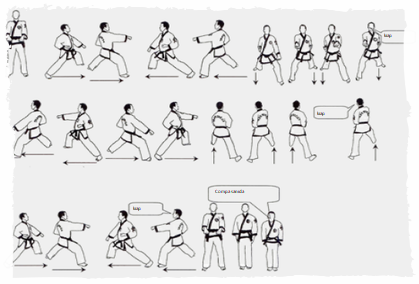KARATE COREANO TANG SOO DO
In any place, at any time you can practice yourself
in Martial Arts ...
Kata is a Japanese word (型 or 形) meaning "form". It refers to a detailed choreographed pattern of martial arts movements made to be practised alone. It can also be reviewed within groups and in unison when training. It is practised in Japanese martial arts as a way to memorize and perfect the movements being executed. Korean martial arts with Japanese influence (hapkido, Tang Soo Do) use the derived term hyeong (hanja: 形) and also the term pumsae (hanja: 品勢 hangeul: 품새).
Kata are also used in many traditional Japanese arts such as theatre forms like kabuki and schools of tea ceremony (chadō), but are most commonly known in the martial arts. Kata are used by most Japanese and Okinawan martial arts, such as iaido, judo, kendo, kenpo, and karate.
Kata originally were teaching and training methods by which successful combat techniques were preserved and passed on. Practising kata allowed a company of persons to engage in a struggle using a systematic approaches, rather by practising in a repetitive manner the learner develops the ability to execute those techniques and movements in a natural, reflex-like manner. Systematic practice does not mean permanently rigid. The goal is to internalize the movements and techniques of a kata so they can be executed and adapted under different circumstances, without thought or hesitation. A novice's actions will look uneven and difficult, while a master's appear simple and smooth.[1]
Kata is a loanword in English, from the 1950s in reference to the judo kata due to Jigoro Kano, and from the 1970s also of karate kata; but the word has come to be used as a generic term for "forms" in martial arts in general, or even figuratively applied to other fields.

To access the video section *click here the first 8 Hyong (Kata) are shown.
Higher Hyong for Dan achievement are not in the public domain*External link youtube Channel
Subscribe on our Youtube Channel to be always connected with news of our
Karate Coreano Tang Soo Do school


